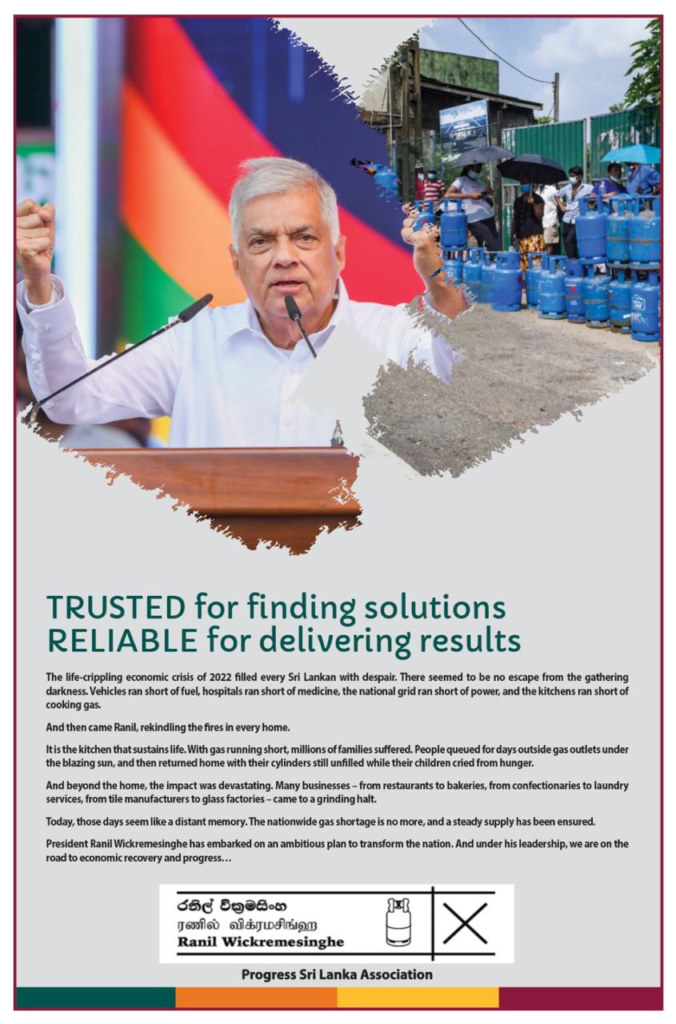P Samarasiri
Article’s background
I happened to see the attached press release on the title “Highlights of the Government Tax Policy and Expenditure Management Measures” issued by the Ministry of Finance on 30 August 2024 (Press here to read the press release) and found that its contents are not only inappropriate in economics but also misleads the public.
I prove it by commenting on its opening section reproduced below. The rest of the press release contains a set of budgetary numbers mostly in meaningless percentages of GDP which has no meaning on the overall economy or living standards affected by a triple crises, i.e., global pandemic, political violence and foreign currency, which the country had never experienced before.

Five contents selected for my comments
I focus on following five contents from the highlighted above.
- Weak government revenue as one of the fundamental causes of the economic crisis.
- The ill-timed tax reduction in 2019 as the major contributor to the country’s credit rating downgrade and subsequent sovereign debt default.
- Inflationary monetary financing.
- Urgent revenue measures to phase out monetary financing and bring inflation under control.
- Fiscal consolidation as a key component of the overall macroeconomic reform programme including debt restructuring framework and primary budget surplus of 2.5% expected in 2025.
Therefore, all contents of the press release are based upon above misconceptions and misunderstanding.
My comments
Comments on the first bullet
- The fundamental cause of the crisis was the inability of the Central Bank (CB) to maintain its foreign currency reserve at adequate or prudent levels over time to service foreign debt and balance of payments as provided for in the Monetary Law Act. The pandemic and political crisis-related factors also contributed to it.
- The government never had adequate revenue to service debt or finance expenditure. Therefore, debt has been the key financing source. Therefore, the government did not confront any problem on domestic currency borrowing to pay for foreign currency required from the CB to service foreign debt. In fact, domestic interest rates also were very low in 2020 and 2021 to raise domestic borrowing at historic low cost. However, the CB had lost the foreign reserve causing the economic crisis whereas the govt revenue was not a contributary factor.
Comments on the second bullet
- The main factor for the downgrade of credit rating was the erosion of the foreign reserve of the CB and collapse of the economy. As stated above, the debt default was a result of the collapse of the foreign reserve. Therefore, the reason given as the ill-timed tax reduction in 2019 is incorrect.
- In fact, the tax revenue fell in all countries due to the collapse of supply chains and economies as a direct result of the pandemic. The political crisis also contributed to it in Sri Lanka.
- The tax cut was an expansionary macroeconomic policy decision of new government in 2019 prior to the pandemic and political crisis. However, the pandemic impact had negative effects on the economy, averting the expected benefits of the tax cut policy. It is common to criticize both tax cut and tax hike. The Liz Truss Govt in UK in October 2022 was overthrown in 45 days on criticism on tax cut, energy subsidy and growth based interim budget.
- Therefore, the tax cut is not the reason for the downgrade of credit rating and the sovereign default. Even if the tax had remained unchanged, the crisis was certain due to dire shortage of foreign currency.
Comments on the third and fourth bullets
- Monetary financing was not new in many countries including Sri Lanka. In fact, the CB as the debt manager cum monetary authority did it to control the yield curve and market interest rates in the monetary policy. It is not a matter for the Treasury to select financing sources based on inflation expectorations. Further, whether the monetary financing is inflationary is not established on data. However, any deficit financing is inflationary in economic theory as it creates credit and money if the production capacity is unchanged.
- Inflation control is a duty of the CB and not of the Treasury. Therefore, urgent revenue measures (i.e., tax hikes) to phase out monetary/inflationary financing as stated is an unacceptable reason. It is like the Treasury gets into the CB’s shoes and a conflict of independent duties between the Treasury and the CB.
- Even tax increases also lead to new money printing as new taxes have to be paid by sovereign currency. Otherwise, tax will be evaded.
- In fact, in all countries including developed countries, monetary financing was the major source to finance fiscal deficits at historic levels to deal with humanitarian crisis caused by the global pandemic. That was the fiscal responsibility.
- High inflationary pressures in Sri Lanka were a transitory result of the disruption of supply chains caused by triple crises and not of the fiscal front at all. If it had been a fiscal matter, high inflation would have still been prevailing as the fiscal front is still the same without any fundamental improvement.
- In fact, monetary and financial system of Sri Lanka was saved by such monetary financing as the monetary base tended to contract severely due to the fast erosion of the foreign reserve which largely determined the Sri Lankan monetary base. If not for the monetary financing, the monetary system would have been collapsed due to shortages of domestic currency.
Comments on the fifth bullet
- Fiscal consolidation and reform programme are just IMF prescriptions to deal with the foreign currency-related crisis which is not a fiscal problem but a monetary policy problem.
- Foreign debt restructuring is still not concluded even after two years of default. The State Minister recently stated at the Parliament that it was a never-ending work requiring continuation of services of international consultants.
- Primary budget surplus is only a sub account which does not represent overall position of budgetary outcomes for the economy. Further, 2.5% is only a statistical hypothesis which is not guaranteed in 2025.
Overall Comment
- The press release is a statement of a Treasury account clerk who does not understand macroeconomic management aspects of the budgetary structure and operations as well as the background of the Sri Lankan economic crisis.
- Therefore, it tarnishes the image of great economists who have served in the Treasury in the past who have been instrumental in the safeguard and development of the economy and living standards of the country through fiscal front since its independence.
- Therefore, the press release is evident for the poor quality of the present Treasury management who lies to the public to coverup its inability to manage the Treasury in the public interest.
- It is a blunt lie if the Treasury states that such budgetary measures can recover the economy and living standards for the next phase of development.
This article is released in the interest of participating in the professional dialogue to find out solutions to present economic crisis confronted by the general public consequent to the global Corona pandemic, subsequent economic disruptions and shocks both local and global and policy failures. All are personal views of the author based on his research in the subject of Economics which have no intension to personally or maliciously discredit characters of any individuals.)
P Samarasiri
Former Deputy Governor, Central Bank of Sri Lanka
(Former Director of Bank Supervision, Assistant Governor, Secretary to the Monetary Board and Compliance Officer of the Central Bank, Former Chairman of the Sri Lanka Accounting and Auditing Standards Board and Credit Information Bureau, Former Chairman and Vice Chairman of the Institute of Bankers of Sri Lanka, Former Member of the Securities and Exchange Commission and Insurance Regulatory Commission and the Author of 12 Economics and Banking Books and a large number of articles published.
EconomyForward Blogspot



